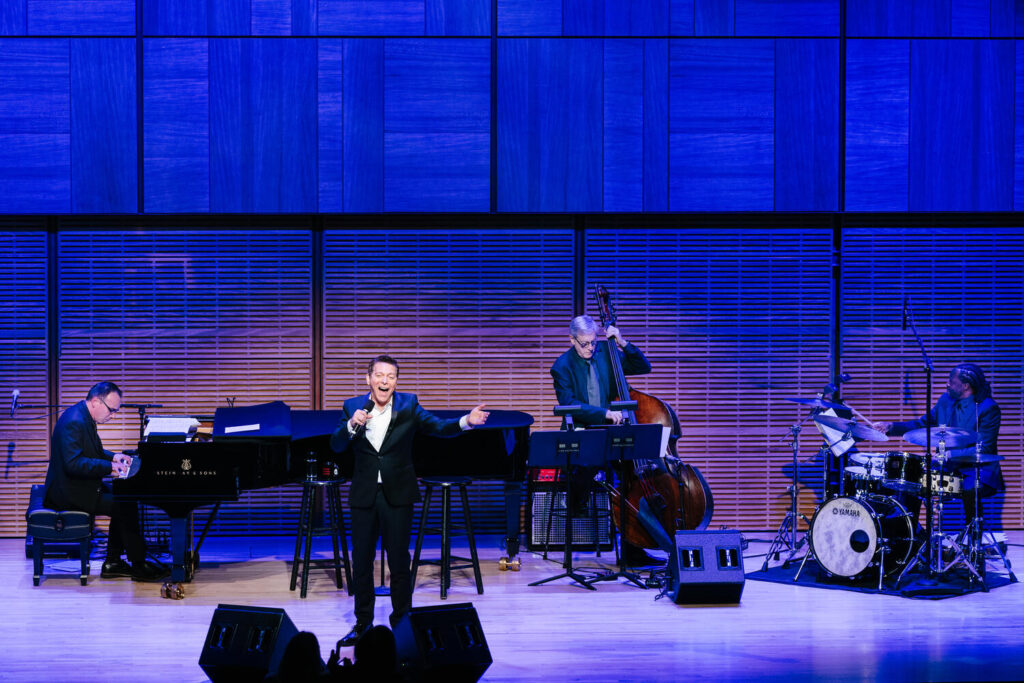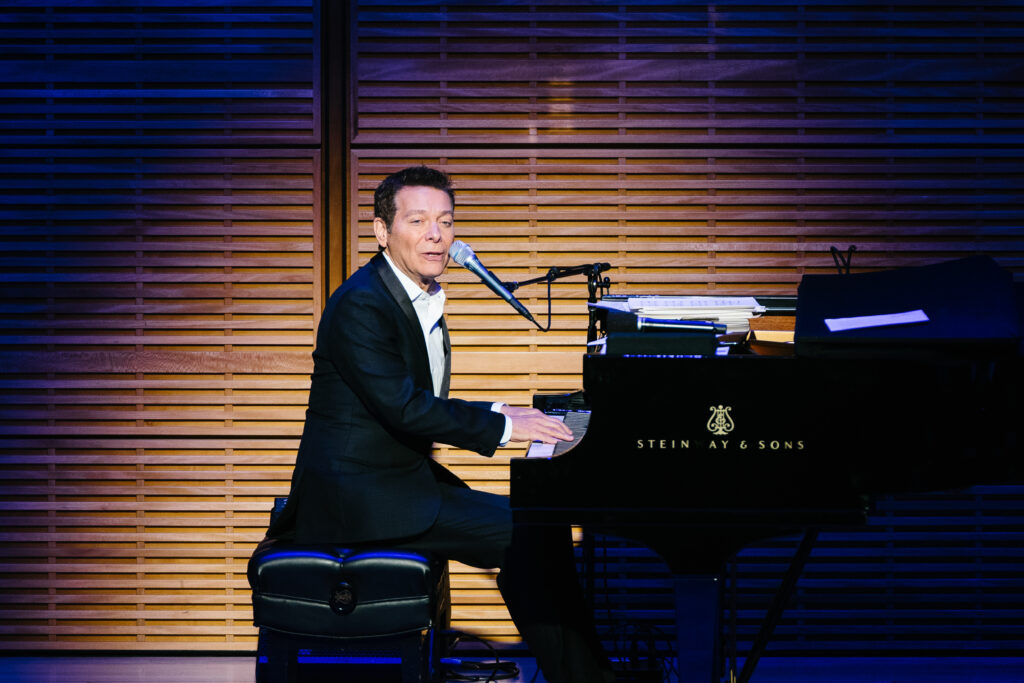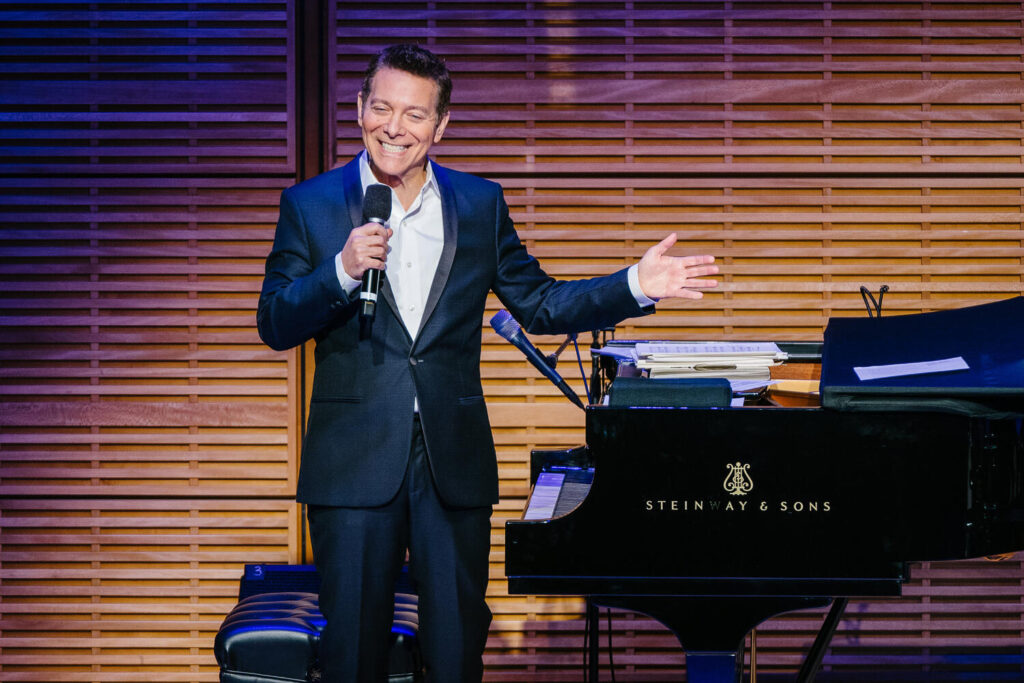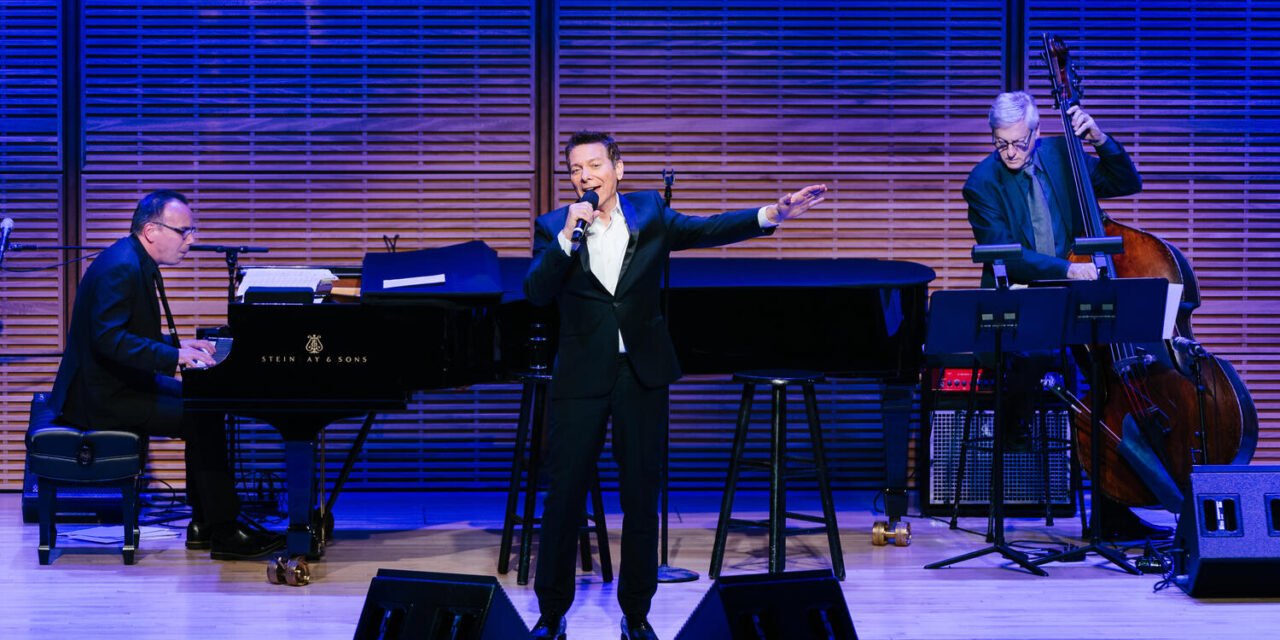By Andrew Poretz . . .
Who better than the keeper of the American Popular Song torch, Michael Feinstein, to celebrate the centennial of Judy Garland’s birth? Get Happy: A Celebration of Judy Garland, the season finale of the much-lauded Standard Time with Michael Feinstein series at Zankel Hall, was a rousing success.

The sold-out show had Mr. Feinstein’s usual trio of top-shelf jazz masters, the brilliant Tedd Firth on piano, David Finck on bass, and Mark McLean on percussion.
The show opened with a peppy “Get Happy.” For the next number, “That’s Entertainment,” Mr. Feinstein used special, Judy-centric lyrics written by Jerry Herman for a special event at Carnegie Hall. The song is inexorably tied to Judy’s historic 1961 concert on the main Carnegie Hall stage.
Mr. Feinstein told of Judy’s origin story as the youngest of the performing Gumm Sisters vaudeville act. (Judy was born Frances Gumm). While a remarkable photo montage was shown behind him, Mr. Feinstein did a “vaudeville medley” of songs Judy performed both in her young vaudeville days and later as a star, including “When My Sugar Walks Down the Street,” “Dinah,” and “Carolina in the Morning.” And “Maybe I’ll Come Back,” with lines like “President Coolidge is a cousin of mine,” a song her parents performed in vaudeville, was a hoot.
The star is an exceptional storyteller, both literally in his anecdotes and through his interpretations of the songs. His voice sounded slightly strained at times. Still, he made all his notes, including some impressively long ending phrases.
Mr. Feinstein took some time before getting to The Wizard of Oz. Garland, a seasoned pro long before that film, had already appeared in seven films, including Love Finds Andy Hardy with Mickey Rooney. Michael, now at the piano, performed lyricist Yip Harburg’s personal favorite from the film, “If I Only Had a Brain,” culling all of the parts together, including Harburg’s “lost” lyrics. For the Cowardly Lion’s lines, he channeled Bert Lahr, ending it with Lahr’s trademark, “Da noive!”
Somehow, Mr. Feinstein injured his finger during this number, causing him to quip that his autobiography would be called “Blood on the Keys.” Mr. Finck happened to have a Band-Aid handy, which Mr. Feinstein applied while Mr. Firth did his best to wipe the ivories clean.
Garland appeared in ten films with Rooney, including several that involved “putting on a show.” Mr. Feinstein performed a medley of songs they introduced in those films, notably “Our Love Affair” (a hit for the Tommy Dorsey band with Frank Sinatra) and “How About You?”


The evening’s greatest highlight was the type of wonderful surprise only Michael Feinstein could supply. Mr. Feinstein is a well-known collector of rare and marvelous musical artifacts. He learned that Judy’s bought a home recording machine for the house she bought her mother. No home recordings had ever been found. He visited this house in recent years, and on his visit he somehow touched a button on a wall that opened up a secret room. There he found the lost recordings. For the very first time, an audience heard Judy Garland’s home recording, perfectly sung, and a capella, of “I’ll Be Seeing You,” a song not otherwise known to have been sung, never mind recorded, by Garland. Mr. Feinstein, at the piano, accompanied this recording. It was thrilling, and tear-inducing. Afterward, he joked that he had to disagree with all those who thought Garland was “difficult to work with.”
Marvelous home color film of Garland with Ira Gerswhin was a sweet introduction to “A New World,” written for her by Gerswhin. It was an intimate song, with only Tedd Firth’s accompaniment.
The finale of “Come Rain or Come Shine” had Mark McLean recreating the superfast Latin rhythm of the 1961 concert version, as slides of Judy at that show played behind Mr. Feinstein and the trio.


For an encore, Mr. Feinstein, back at the piano, played and sang the verse to “Over the Rainbow,” after which film appeared of Judy singing it on the Command Performance radio program in 1943. He sang harmony with Garland on the song’s coda.
Mr. Feinstein was assisted greatly by noted Garland historian John Fricke, who helped him develop the concept and write the show, and supplied much of the rich source material for the gorgeous photographs and video slides that were projected on Zankel’s large screen. The multimedia material gave great visuals to both the musical narrative and the show’s script. The photos have been lovingly restored, with many tinted or colorized.
Standard Time with Michael Feinstein (Get Happy: A Celebration of Judy Garland) took place on March 27 at Zankel Hall (at Carnegie Hall), 881 Seventh Avenues between 57th and 56th Street (https://www.carnegiehall.org/Events/Zankel-Hall).
Photos: Fadi Kheir (from the November 2022 concert), courtesy of Carnegie Hall


















